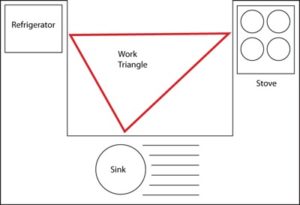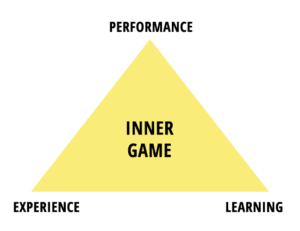Assessing Value in Construction Beyond Years of Experience
Quite often, we have candidates who have worked in the construction industry emphasize their qualifications and value by stating how many years they have worked in the industry. We often hear a candidate tell us that they have 25+ years of experience or even 35+ years of experience.
While we are thankful for each and every person who has committed to serving in the construction industry, the number of years they have been a part of the industry may equate to considerably less value than someone who has been in the industry half as long.
The only way to assess the value in years is to find out not only if they showed up on gameday but also who their teammates were and what position they played. Did they surround themselves with people and companies who were continually improving their game, or did they do the opposite?
Efficiency in Construction: Applying the Work Triangle Concept

Those familiar with kitchen layout and design might know the “work triangle” as the recommended distance and layout between the sink, stove, and refrigerator. Efficiency is the triangle’s main goal, as it keeps all the major workstations near the cook without placing them so close that the kitchen becomes cramped. The work triangle is also designed to minimize traffic within the kitchen so the cook isn’t interrupted or interfered with while working. If your kitchen is not designed with this in mind, your performance when cooking could be altered. You may even get frustrated at times, which ultimately might reduce your interest in cooking.
Gallwey’s Inner Game Approach: Experience, Learning, and Performance in Construction

Gallwey’s Inner Game Work Triangle
The blog “The System Thinker” has an article by author Timothy Gallwey from his best-selling book for the workplace centered around his “Inner Game” approach. Timothy Gallwey started as a sportswriter, helping coaches and athletes achieve their best performance. He then proceeded to take his theories into the business world. Gallwey’s workplace triangle is made up of experience, learning, and performance.
Measuring Success in Construction: The Three Pillars of Time, Quality, and Budget
If you ask a group of business owners how they equate the success of their employees, it is typically unanimous they would value performance over practice all day long. Performance ratings are what matters, especially in construction. Performance in the three areas of time, quality, and budget are how we measure performance in construction. Do-overs are never an option! A do-over seriously hurts a company’s finances and reputation, and most of the time, if a do-over is required, the original contractor is booted and a new one brought in!
The only way to up your performance to coincide with an increase in value and opportunity is through practice and learning, especially in construction. Your marketability has little or nothing to do with how many years you participated or what you might think or feel you deserve in opportunity or monetary compensation.
Mastering the Inner Game in Construction: Breaking Free from Assumptions and Doubt
Gallwey explains that many companies and individuals get tunnel vision and focus strictly on performance. Leaders don’t create the workplace triangle by balancing an individual’s expected performance while leveraging the person’s experience and up-to-date learning as it relates to performance—not just of the individual but for the whole team.
Gallwey states, “Every game is composed of two parts: an outer game and an inner game. The outer game is played in an external arena to overcome external obstacles in the way of reaching external goals; the inner game focuses on internal obstacles as well as internal goals.”
To master the inner game, an individual must get rid of the following:
- the assumption that “they already know”;
- the assumption that learning means remediation,
- fear of being judged,
- doubt,
- trying too hard to learn and to appear learned.
Too often, during an interview, a candidate is in front of us because they don’t assume and are not afraid to ask for help but either get judged, are ignored, or are forced to take an unnecessary risk by their supervisor. They want out. They want to be with a company and work with a team that values their ability to apply what they have learned with their interest and willingness to continue to learn for increased performance.
The companies we work with that value an employee with the ability to get rid of assumptions, doubt and fear and offer them a safe environment to ask questions and get professional answers are the companies attracting and keeping the top talent.
Gallwey ends his article with, “The best managers will provide what support and resources they can to the effort and will make it their mission to shape their workplace into an optimal learning environment. The payoff will be improved business results and a corporate culture that attracts employees who equally value growth in capabilities.”
Are you showing up for the game or mastering the inner game?
To Years that Count,
Suzanne Breistol, on behalf of the FLCC Team!




